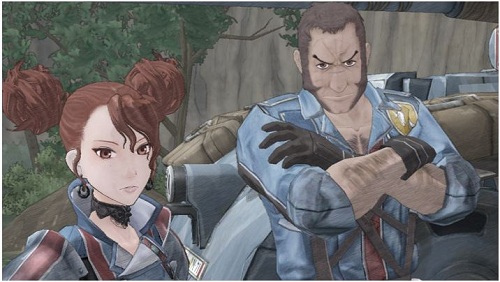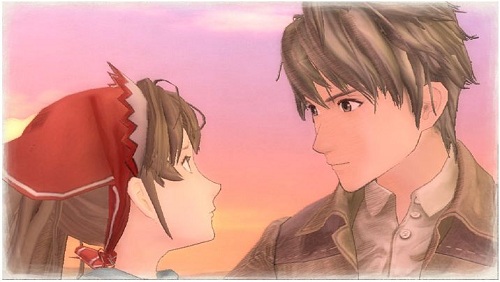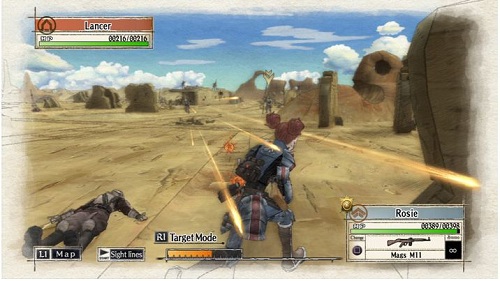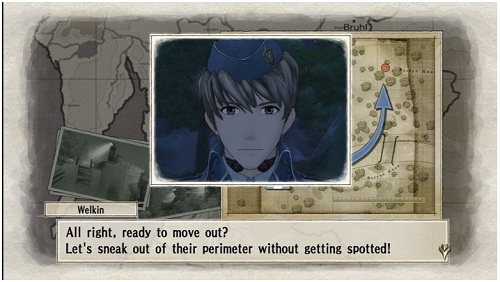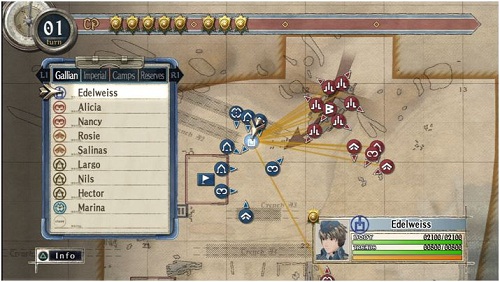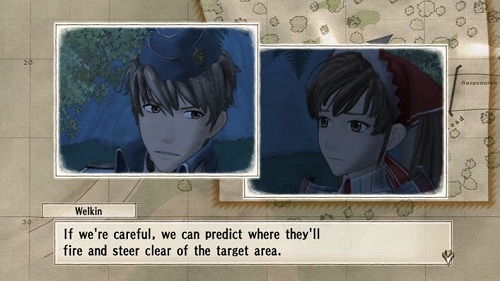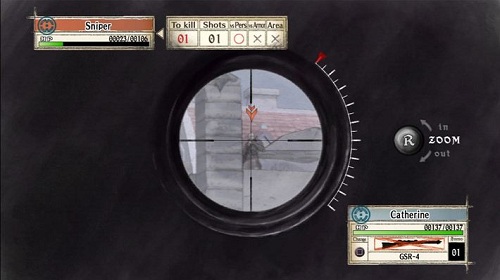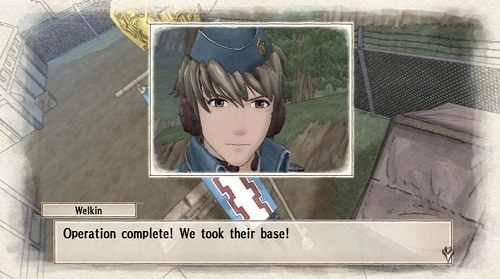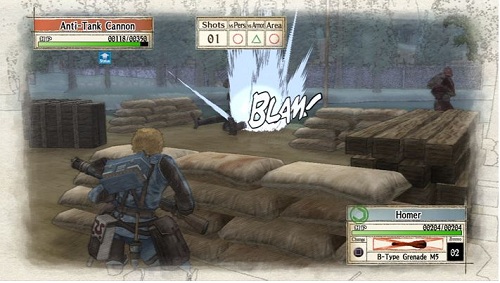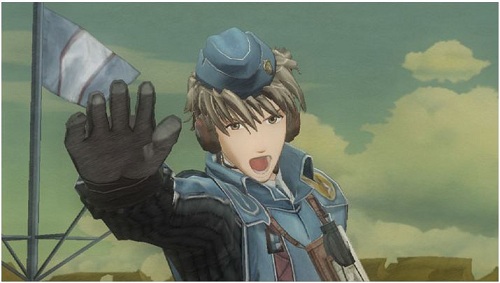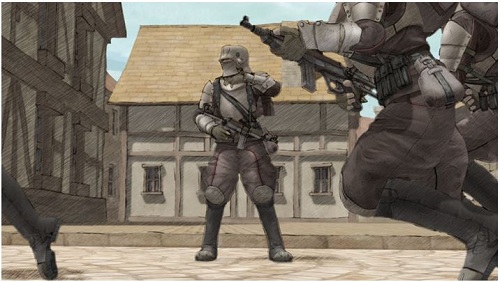Valkyria Chronicles Review
Reviewed by Vari on Oct 21, 2010
Valkyria Chronicles manages to bring innovative gameplay into an already well-rounded package.

Name - Valkyria Chroincles
Platform - PlayStation 3
Publisher - Sega
Developer - Sega
Release Date - November 4, 2008
Genre - Turn-based Strategy RPG
ESRB -T (Teen)
Valkyria Chronicles is one of those games that surprised me the instant I played it. This isn't because of its unique visual design or superb score, nor is it because it's one of the only strategy games on the PS3. Valkyria Chronicles surprised me simply because of the amount of innovation put into it. SRPGs have almost always been the same basic formula that has limited their audience to a specific niche group. VC changes that. Not only does it use the "out with the old, in with the new" technique, but it reinvents the genre to retain some of the same mechanics people know and love while adding its own twist on things.

Story
Much to my surprise, Valkyria Chronicles's storyline is extremely lacking. From what I heard about the game beforehand, I was expecting an excellent well-crafted story. While it's true that everything is put together nicely and presented in exceptional cutscenes, it is all too familiar to anyone who has experienced a war story before. It's essentially an alternate version of WWII with some fantasy in the mix. The blend works well, and doesn't ruin any real war moments either. This is the second alternate WWII game I have played and I have to say that I am liking this setting a lot more than I expected.
VC's story is slow to start moving, but once it gets going, it doesn't stop. Nearly each chapter has an enjoyable moment and there are numerous scenes throughout the game that I still have fun rewatching. There are actually a good number of substories put into Valkyria Chronicles as well, all relating to the central plot. Each main character has a thoughtful and polished backstory that gives them a little depth. Unfortunately, all of these strengths cannot prevent Valkyria Chronicles from being unoriginal when it comes to plot and characterization. The story may be presented well, but it's been done time and time again in countless tales revolving around war, not to mention it's insanely preachy (almost to the level of Eternal Sonata). Don't get me wrong though; the story is by no means bad. It's good, maybe great, but nothing to get too excited over.
Overall, Valkyria Chronicles's storyline is one that connects war, revenge, compassion, love, morality, and all that good stuff into a satisfactory form that shows a lot of care and promise, but we've all seen this before.
Gameplay
This is where Valkyria Chronicles shines. There are two sides of the battle: you and the enemy. Each take turns moving their units and ordering them to attack the opposing force until one side is eliminated. Pretty formulaic, right? Now the changes start to kick in. When you choose a unit to move, you are put into a 3rd person view (as opposed to a top-down view) and control that character. Everything plays in real time as you move your character and order them to attack. The enemies fire at will as you move, but something that people will probably find strange is that those enemies stop firing right when you begin to aim. This results in the player constantly ending each character's move immediately after firing their weapon in order to avoid getting hit. It feels very loose, and that's not the only thing. Firing and having the enemy duck only to counterattack and kill you on the spot, odd accuracy and hit levels, only being able to take cover near sandbags, and other functions like this are bound to be annoyances. Trust me though, if you can get used to all of this, then you're in for a real treat.
What keeps the whole "strategy" part in check is the division of classes between units. There are five classes: scout, shocktrooper, lancer, engineer, and sniper. Each of these have their own specialties and they must be used in balance in order to finish the game. The differences are fairly simple, such as scouts having little defense but being able to traverse great distances, while lancers can take many hits before going down and have the ability to take down tanks with ease at the cost of very little movement each turn. At first I found I only needed to use one or two classes and one or two units, but later in the game I realized how useful it is to use every unit on the field and each class equally. What's interesting is that you level up each class instead of leveling up each unit. This eliminates what many people dread when it comes to RPGs, grinding. I suppose it's an efficient system that never gets in the way, but I couldn't help but wish it had those traditional leveling up systems I am so used to. I like it when my characters earn something for their individual accomplishments instead of them all being the same, but I guess it makes sense being a team and all.
Each unit is exactly the same as the others of their class. They do have backstories, but they're in an encyclopedia the game provides and are never mentioned elsewhere. Other than those backstories, the only difference between basic units is their potentials. These are special actions that can either enhance or weaken the unit, depending on the conditions. One might be called "desert allergy", which results in the character being weaker in desert maps. Another could be "vegetable maniac" which strengthens the character when vegetables are around (which seemed to always happen for some reason...). Characters can unlock new potentials through battle and story progression, but none of this really matters. The potential ups and downs are barely noticeable and there is no reason to pay attention to them or form a party with potentials that go hand-in-hand. It's a system that needs some more work.
There is one more type of class other than the five that are on-foot, and that is the tank. Controlling the tank is sticky and lacks polish, but when you get the hang of it then it's not so bad. I'll be honest though, I rarely used tank units at all. You see, to move a unit you use these things called Command Points. Tanks use two Command Points while all other units use one. I don't see the benefit of using two command points on a tank rather than moving units twice, except for maybe a tricky situation or two. That's something to work on in the sequel, but the tanks are not useless; I just hardly ever used them. Another function I rarely used was the orders you have at your command. There are various declarations you can request to improve your chances at winning the battle, such as increasing all units' attack power or requesting mortar support fire. Depending on which order you choose, these cost one to three command points. Once again, I felt it was more beneficial to just use those command points to move my regular units. I did use orders occasionally, but I think it would have been better to not have command points the pool that every single action uses up.
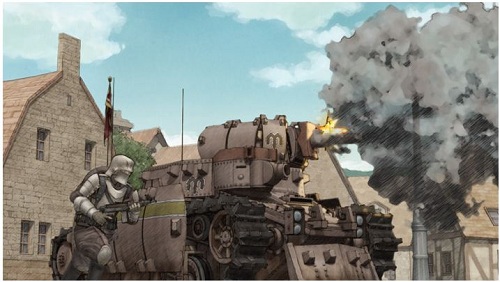
When a unit falls, they remain on the field for three turns. If those three turns expire or the enemies snatches them before that, then they are gone for the rest of the game (excluding story characters). This is old news to Fire Emblem fans, and perhaps brings some nightmarish flashbacks, but Valkyria Chronicles forms a very forgiving system in response to the perma-death function. Not only do the characters stay on the field for three turns, but you have the chance to save them by either winning the battle or bringing another unit to the fallen one to call over a medic. If the latter is done, then that fallen unit can be respawned at any allied camp during the next turn. This brings up another part of the game that I love. The ability to respawn fallen units adds a whole lot more strategy than just chipping away at the enemy army while you heal your units. It's a constant offensive battle that can easily go back and forth, and that is where the essence of continuous strategy lies.
Winning a battle earns the player money and experience. Experience is used towards leveling up classes and acquiring more orders. Money, on the other hand, is used to upgrade weapons and armor and purchase side missions. There are a ton of upgrades available to purchase for the tanks, but you are limited to a certain number and I never really bothered with it considering I only used the tanks when I needed to. I did upgrade my class's weapons and armor though. There are multiple paths to take when upgrading weapons and it's tough to say which one would be the most ideal for completing the game, but this allows you to put some diversity between units. The game lets you replay any previous battle and even throws in skirmish maps in case you want to train and upgrade more before the next chapter. I never replayed battles, but I did do each skirmish when it was unlocked, along with the optional battles that can be bought within the game; doing both of these had me up-to-date with upgrades and experience, so it's not that difficult to be prepared for each battle.
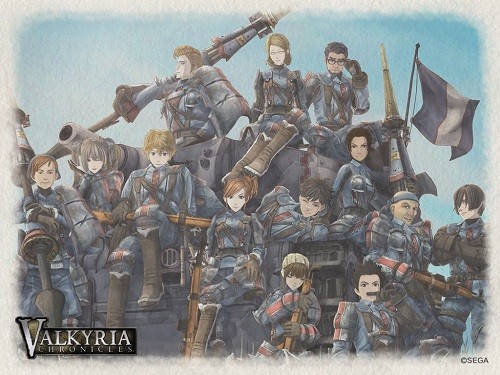
I simply must to talk about the AI in Valkyria Chronicles because it's so horrible that its one of the reasons why I found the game so entertaining. The AI is flat-out hilarious. They're actions are scarcely reasonable and they always put a smile on my face (it's easy to commentate their actions/thoughts and have a good time if somebody else is watching). However, there are moments where the enemies are absolutely genius, to which I have to give a standing ovation. I can tell that they are programmed to move one unit no more than three times. This is understandable, but only if the unit is moving across the battlefield (because the more you move a unit in a turn, the less distance they can cover). If the unit is in range of enemies, then it makes sense to keep using that unit to take out the enemies near him, rather than have him standing there to be shot at when the player's turn comes up. Here's the thing though, this game would be 10x harder if the AI was actually good. I'm honestly afraid to see how difficult it would get if the AI was as good as a human player. This opens up the idea for challenging and rewarding multiplayer battles, but they're not in this one (maybe future installments though).
Even though Valkyria Chronicles has incredibly stupid AI, it's worth noting that it has a nearly perfect difficulty. I only lost once during the entire game, and that was because of a stupid mistake. While that makes the game sound easy, I still found it to be quite challenging at times. The maps and objectives are varied to the point where you never feel like you're doing the same thing. It's obvious this was designed by a team that really knows how to alter strategic gameplay and make each battle memorable and unique, while still having a lot of thought process required by the player. You always have to be on your toes and pay attention to the tips given during the briefing and battle itself. The final chapter is not what I would have preferred, but the payoff before it is well worth it.
Despite having what I consider underdeveloped elements (potentials, orders, tanks), it only strengthens Valkyria Chronicles future. Some of the gameplay functions are underdeveloped and need work because it's the start of possibly a new genre in itself. As with all experiments that demonstrate innovation, they are not going to be perfect. However, perhaps I'm wrong about the whole innovation thing. After all, I haven't played every strategy game out there. It's always possible that VC isn't the first one to bring these tweaks to the genre (Ring of Red maybe?). Regardless of whether it was first or not, VC brings that innovation to a larger audience and has some truly remarkable and memorable gameplay moments that I am proud to have experienced.
Graphics
It's obvious from the screenshots that Valkyria Chronicles provides a new visual style that is both impressive and visually appealing. I especially like the watercolor border around cutscenes, and the emphasis of darker areas on people and objects has a unique look to it. The CGi is incredible and boasts some of the best artistic graphics I have seen on the PS3. All these bright screens might give the impression that it doesn't look much like a war game, but there are plenty of dark and gritty visuals during the journey as well. Valkyria Chronicles is pure eye candy and there are no complaints here.
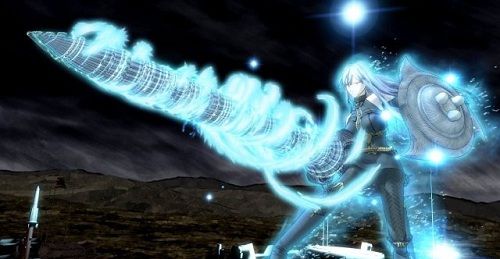
Music, Sound, and Voice Acting
Most likely my absolute favorite part of Valkyria Chronicles is its musical score. It doesn't contain the typical heroic brass feel that many war stories seem to hold. Instead, we are given orchestrated masterpiece upon masterpiece that perfectly sets the tone and does its job by not getting the way while sustaining excellence. There is a lyrical piece that is played mid-point of the game, and I cringed at the thought of it; after witnessing the scene, I think it's safe to say it is one my favorite moments of the game because of the song alone. Perhaps the most rewarding part is that you get the entire score unlocked upon completing the main storyline.
Sound effects are exactly what you would expect. Gunfire, tank cannons, explosions, and things of like are all used how they should be. The sound is very subtle and that's probably why it got the job done for me, but those shooter fans might notice a decrease in the sound design quality they're used to (not that it really matters here).
Voice acting is another aspect I had no problems with. Each VA fits their character well, and none of them made me cringe. I always expect it to be difficult act out war without sounding cheesy and overdone, but the VAs in Valkyria Chronicles pull it off nicely. Not to mention the dialogue is pretty good too (minus the preachy parts I mentioned before).
Value
The game took me around the 35-40 hour range, and that's including sidequests. It never felt too long or too short to me, but some might say it overstays its welcome. The sidequests are of the same quality that is shown through regular battles, and are well worth taking (because of both story and gameplay). There is not much a reason to play the game again after the story's end, but getting all the medals is an option that's always there. Either way value is not an issue here; there are plenty of imperial soldiers to fight.
Score ~ 9/10
Reasoning for the score above: After a somewhat disappointing ending, I really wanted to put Valkyria Chronicles in the 8s; but as I listened to the score again and looked at the solid side content, I realized that Valkyria Chronicles is just too well-done of a package to be considered less than superb. It has a lot of heart and care put towards it, and each element is strung together into a very satisfying and enjoyable experience that is easily worth anyone's time. Sega has proven through the Shining Force series that they know how to make strategy games, and once again they have reinvented the genre and exceeded my expectations.
I would also like to add that the opening is exceptionally entertaining and might be one of my favorites as I look back on it, albeit spoilerific.
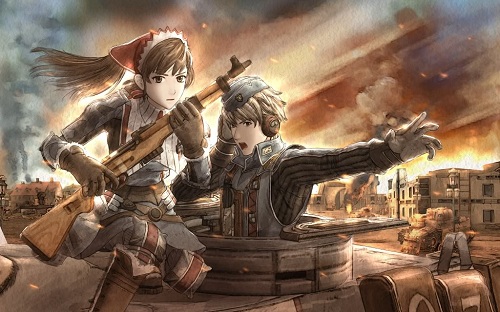
Thanks for reading,
~Vari
Subscriber, NoobFeed
Related News
No Data.


